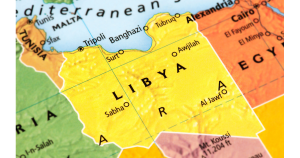As today the International Criminal Court (ICC) resumes the trial of Kenyan Deputy President William Ruto, No Peace Without Justice has urged the European Union to be more proactive and exert pressure on Kenya to extend all possible cooperation to the ICC and to take all possible steps to guarantee fair, smooth and effective proceedings, including to ensure proper protection for victims, witnesses and anyone else connected in any way with ICC proceedings as well as their full participation in the justice process.
The call was made by Greta Barbone, the Tunisia Project Coordinator and Senior Associate of the International Criminal Justice Program with No Peace Without Justice, who spoke at an event at the Institute for European Studies focusing on the ICC and Africa and the difficult questions for the EU and many of its member states which recent events in Kenya have raised.
“The EU should urge Kenyan representatives to cooperate with the ICC in all of its public statements and bilateral meetings” said Ms Barbone. Meanwhile, today the Hague-based court unsealed an arrest warrant against Walter Osapiri Barasa, a Kenyan citizen accused of trying to corrupt witnesses involved in ICC cases regarding Kenyan officials. The ICC Prosecutor says that Barasa tried to influence witnesses by offering to pay them to withdraw as ICC Prosecution witnesses.
Ms Barbone also added that the authorities in Nairobi have launched a massive campaign to present the President Uhuru Kenyatta and his Deputy as the “victims of international justice while the real victims of the 2007-2008 Post Election Violence in Kenya are forgotten. It is important to bring back the focus where it should be: the ICC is a judicial court to address mass crimes when national jurisdictions are not investigating and prosecuting them and to provide redress to victims.”
On 10 September 2013, proceedings against Kenyan Vice-President William Ruto and radio broadcaster Joshua Arap Sang have opened at the ICC in The Hague. Both men are facing three counts of crimes against humanity, including murder, forcible population transfer and persecution, for allegedly organising or inciting the 2007-2008 post-election violence that killed at least 1,100 people and displaced more than 600,000. The trial of Kenyan President Uhuru Kenyatta, who faces five charges of crimes against humanity including murder, rape, persecution, deportation and other inhumane acts, is due to start on 12 November 2013.
Although the Kenyan authorities have stated that they will cooperate with the ICC, they have also made deplorable attempts, including recently before Kenya’s Parliament, to undermine and affect the ICC’s work to pursue justice for these crimes. In an emergency session convened at the beginning of September, Kenya’s National Assembly passed a motion to introduce a Bill within the next 30 days aimed at ending Kenya’s membership of ICC. While this decision is another disgraceful and shameful attempt by the Kenyan authorities to protect its leaders, Kenya’s withdrawal from the ICC Rome Statute would not discharge the country from its obligations related to existing investigations or proceedings carried out by the Court. However, it would finally remove any pretence of Kenya being willing and able to conduct genuine national proceedings, to the detriment of any complementarity.
- Read the article as published by Stanislava Gaydazhieva in New Europe, 2 October 2013
- For further information, please contact Greta Barbone on gbarbone@npwj.org or +216 28385079 or Nicola Giovannini on ngiovannini@npwj.org or +32 (0)2 548-39 15.




